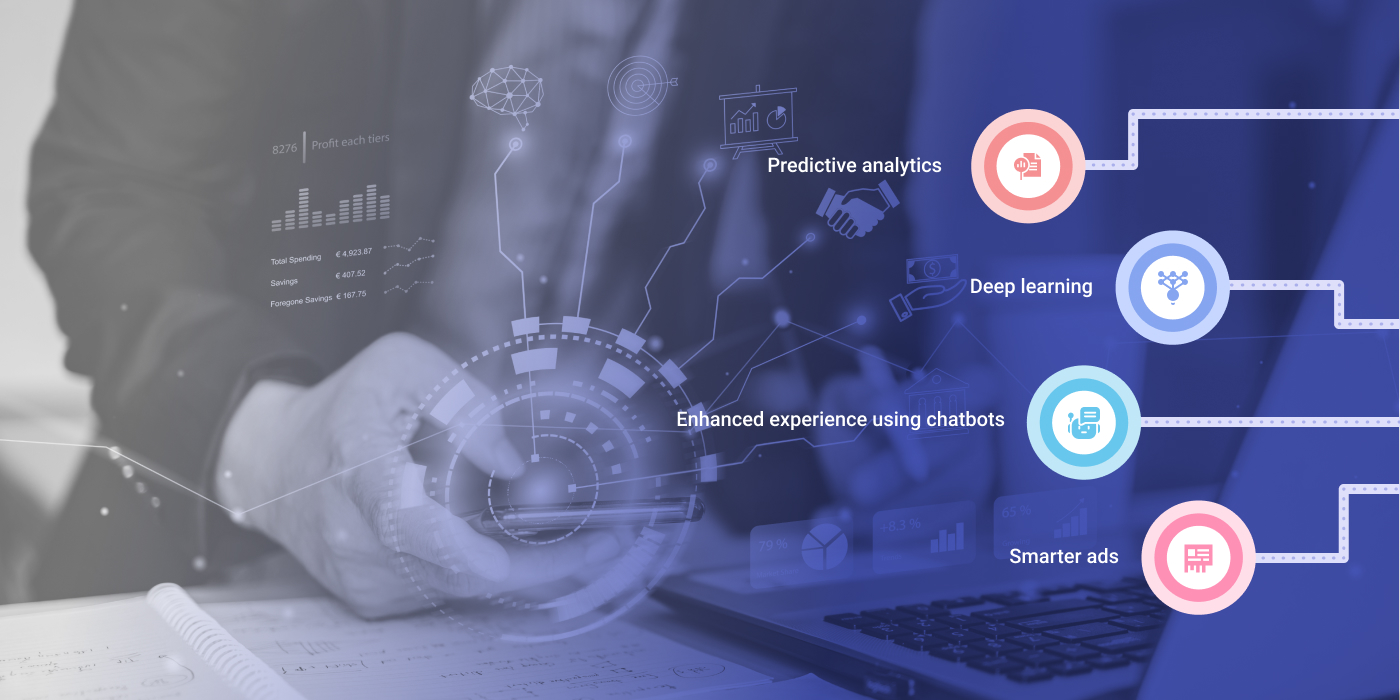What is AI-Enabled Marketing and How to Use it in Your Campaigns?



As far as modern and disruptive innovations go, none comes close to how Artificial Intelligence (AI) is increasingly becoming the go-to for, among other things, productivity, cost reduction, revenue growth, efficiency, and most importantly, improved customer experience.
AI’s popularity is evidently growing remarkably. The global AI market size is projected to grow by $309.6 billion by 2026, up from $58.3 billion in 2021, which represents a compound annual growth rate of 39.7 percent.
This phenomenal growth is largely attributed to AI’s adopters’ ballooning need to remain super competitive in their respective spaces. The ongoing global health crisis has also single-handedly increased the adoption of AI-enabled services across all sectors as organizations try to keep up with emerging consumer demands and the unexpected rapid shift to online.
According to a joint global survey, almost 85 percent of top executives believe AI will allow their companies to obtain or sustain a competitive advantage.
Most organizations and brands have finally overcome the initial wait-and-see attitude and are now fully embracing the growth-oriented tool not just for their overall operation but for their marketing efforts as well.
It’s also no secret that AI is now somewhat occupying a big chunk of day-to-day lives. Most of us even interact with AI-enabled services and devices without realizing it and probably think it’s normal.
Take Alexa or Siri, for instance: these two assistants have now become more like family and are no longer considered threats to privacy. This is because the value and convenience they bring to the lives of many people are, to put it mildly, outstanding.
While it’s not been smooth sailing for AI since it was discovered, this all-important innovation has remarkably improved over the years. It was now just a matter of time before businesses realized the unstoppable power of AI and how they can explore its potential to drive their sales efforts.
This, ladies and gentlemen, is how AI-enabled marketing came to be.
AI-enable marketing involves the leveraging of advanced, intelligent technologies to identify and collect relevant data, customer insights, and online behavior to make data-driven decisions that ultimately impact marketing efforts.
AI has various applications in marketing. For example, CRMs are now using AI and machine learning to assist businesses and brands in critically analyzing various aspects of their customer’s relationships, while apps have adopted deep learning to help brands boost their personalization efforts.

Image Source: WordStream
In marketing, AI is largely used to help marketers better understand their target audience behaviors as well as predict their actions based on their previous interactions with them.
By doing so, AI puts marketers in a better position to create the right marketing strategy and also target the right demographic, saving them time, effort and cost.
Marketers turn to AI to drive the majority of their marketing activities and in the process, they are getting a decent return on investment.
1. Predictive analytics: This is an AI-driven approach that’s helping brands predict, with near military precision, the purchasing patterns of their target demographic. Using vast quantities of consumer data, marketers can confidently and masterfully forecast a customer’s next cause of action. In 2012, Target used this approach to predict a teen’s pregnancy based on her previous purchase behavior long before she even knew she was pregnant.
2. Deep learning: This is where computers are able to recognize patterns in images, voice, and text to extract specific information. By doing so, marketers are now able to understand a customer’s behavior. This information is then used to keep them engaged using relevant brand information. Social media giant Facebook has consistently used this object-recognition tactic to rank images in users’ feeds and also understand video footage.
3. Enhanced experience using chatbots: Customer experience is considered a major determining factor during a customer’s purchase journey. To ensure that their customers get the best experience money can buy, brands turn to AI to refine their customer experience strategy. Chatbots have, in turn, become the go-to solution for providing customers with intuitive responses. The idea is to recreate how you would normally speak to a real customer service representative. Mimicking human experience is what makes chatbots popular.
4. Smarter ads: Most people don’t like ads. More than a fifth of the world’s internet users, or 419 million people, have installed some kind of mobile ad-blocking software on their smartphones. Part of the reason why ad-blocking is rampant is that most of these ads are irrelevant, not to mention directed to the wrong audience. Using AI, marketers are now able to create personalized ads using insightful data collected from social profiles and keyword searches. This alone makes ads smarter and significantly more effective.
These are just some of the reasons why most marketers are now using AI-enabled marketing to scale up their marketing results. The results pretty much speak for themselves.
AI has helped marketers to drastically speed up and optimize a dozen marketing tasks that ultimately help save time and money. And apart from boosting engagement, interaction and experience, it also drives conversions.
The good old email marketing tactic has also not been spared when it comes to the deployment of AI. On its own, email marketing is quite effective and quite frankly, a marketing force to reckon with.
Now throw AI in and what you get is email marketing on steroids! Here’s why:
AI-based tools such as Mailchimp and Constant Contact are great examples of platforms that are now driving successful email campaigns. If your end goal is to keep your email subscribers, customers and prospects fully engaged with relevant content and ultimately drive sales and conversions, then these two platforms are what you need.
eCommerce is also another area where AI is likely to shine bright in the near future. Despite its low adoption, AI has enormous potential in the eCommerce space. eCommerce giant Amazon attributes over 35 percent of its overall earnings to its AI-enabled product recommendation technology, which continues to be central to its upselling and cross-selling efforts.

Image Source: Forbes
And with competition within the burgeoning eCommerce space becoming even steeper, AI-enabled eCommerce might just be your strategy to beat the competition. You just need to know how to do it right.
Over the last couple of years, brands have flocked the eCommerce space mainly due to shrinking local consumer markets. But with eCommerce, opportunities to sell to a wider audience are endless. This is because eCommerce knows no geographical boundaries.
With AI-powered eCommerce, you can use automated brand descriptions to keep customers and prospects interested in your brand or service. Expensive errors can easily occur if your marketing team is repeatedly writing hundreds of product descriptions manually.
AI can also help your team generate smart product recommendations that ultimately increase lead generation and conversion. Because AI utilizes big data in the form of customers’ shopping behavior, search inquiries and even lifestyle, you can easily recommend relevant products or services as well as encourage customers and prospects to return to your site and do more shopping.
With AI firmly integrated into your eCommerce strategy, you will experience higher visitor retention and faster inventory turnover.
As soon as your AI game is up and running, the next most important step is to firm everything up with a proper and secure integration solution. This will not only help you to streamline your digital marketing activities but also ensure that all your data and customer insights are used effectively and in a timely fashion.
Using email and CRM/ERP/financial platforms separately is great for the most part. However, integrating these platforms with the right solutions such as Mailchimp for Salesforce for top-notch bidirectional marketing and Shopify for Constant Contact for your eCommerce can multiply the overall effect and impact of your digital campaigns.
Integration helps you to eliminate data silos, which can drastically weigh your marketing down, which is bad for business. Using a tried-and-tested integration partner like SyncApps, all your data will be seamlessly synced making it possible to finally create memorable, high-impact digital campaigns.

Campaign reporting for your CRM, ERP, marketing automation, among others, is also boosted allowing you to know how your email marketing campaigns performed, what worked, and what needs tweaking. Such data is crucial for future campaigns, something standalone platforms cannot provide.
It’s a no-brainer that AI-enabled marketing is your next growth frontier. Consumers have also now become used to AI having interacted with tools such as chatbots and automated email replies almost on a daily basis. For this reason, embracing AI-powered marketing places you on the right path to success. The only cherry on top is integration, which basically brings everything together and ensures that you reap the full benefits of digital marketing.